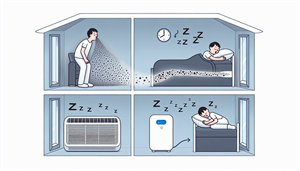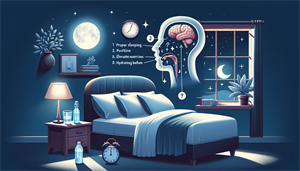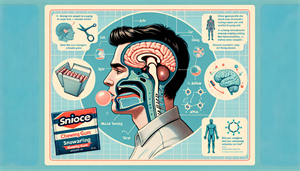
Do Air Purifiers Help With Snoring?
Do air purifiers help with snoring? Can they be the secret to snoring less at night? Simply put, they can. Air purifiers help with snoring by removing airborne irritants that trigger nasal congestion and inflammation—common culprits behind those nighttime sounds. This article delves into the link between air purifiers and snoring, helping you understand how breathing easier at night could be just a filter away.
Key Takeaways
Air purifiers can help reduce snoring by eliminating airborne irritants and allergens such as pet dander, dust, pollen, and smoke, which often cause nasal congestion and throat irritation. Air purifiers equipped with HEPA filters are particularly effective in capturing a wide range of harmful particulate matter, potentially clearing the airways and reducing snoring, while those with activated carbon filters can also neutralize odors for a more comfortable sleep environment.
Choosing the right air purifier involves considering factors such as the presence of true HEPA filters, noise levels suitable for sleep, additional features to enhance sleep, and ensuring proper placement and regular maintenance to maximize air quality improvements.
The Connection Between Snoring and Air Quality
First, it’s essential to comprehend the relationship between snoring and air quality. Snoring is often caused by the vibration of respiratory structures due to obstructed airflow. Factors such as allergens and irritants present in our indoor air can contribute to this obstruction, leading to snoring.
Hence, a key to a peaceful night’s sleep could be as simple as improving the quality of the air we breathe. Air purifiers can be a potential solution to this issue. They work by removing pollutants such as: pet dander dust pollen spores bacteria cigarette smoke from our indoor environment. These pollutants are known irritants that can contribute to snoring by causing throat irritation, nasal congestion, and watery eyes.
Thus, employing an air purifier to purify our indoor air can foster a more conducive environment for uninterrupted sleep.
Allergens and Irritants
Delving into the details, we should focus on allergens and irritants. These airborne particles can cause nasal congestion and inflammation, which can contribute significantly to snoring. In fact, most air purifiers are designed to remove these allergens and irritants, promoting better sleep by creating an environment that is free of substances that can cause respiratory irritation. Air purifiers enhance the improved air quality by eliminating allergens and particles like: dust pet dander mold spores VOCs Air purifiers can potentially reduce nasal congestion by effectively removing irritants that cause discomfort and disruptions, such as snoring, leading to a better night’s sleep.
Sleep Apnea and Air Quality
Sleep apnea, a serious sleep disorder, can also be impacted by poor quality air. In individuals with obstructive sleep apnea, breathing repeatedly stops and starts during sleep, often leading to poor sleep and intense snoring.
Poor air quality, laden with allergens and irritants, can exacerbate this condition, leading to more frequent disruptions and louder snoring. However, while air purifiers can help create better air quality by removing airborne allergens and irritants, it’s important to note that they are not specifically tailored to directly address snoring caused by sleep apnea.
That said, running an air purifier throughout the night can be beneficial as it helps maintain a clean air environment, which may potentially reduce snoring-related disturbances.
How Air Purifiers Can Help Reduce Snoring
Considering the link between air quality and snoring, it’s vital to grasp how air purifiers could lessen snoring. As we’ve already discussed, air purifiers work by removing allergens and irritants from the air, effectively reducing nasal congestion and inflammation, which are common causes of snoring. By creating a cleaner and healthier indoor environment, air purifiers can contribute to a reduction in snoring, leading to better sleep quality and overall well-being.


